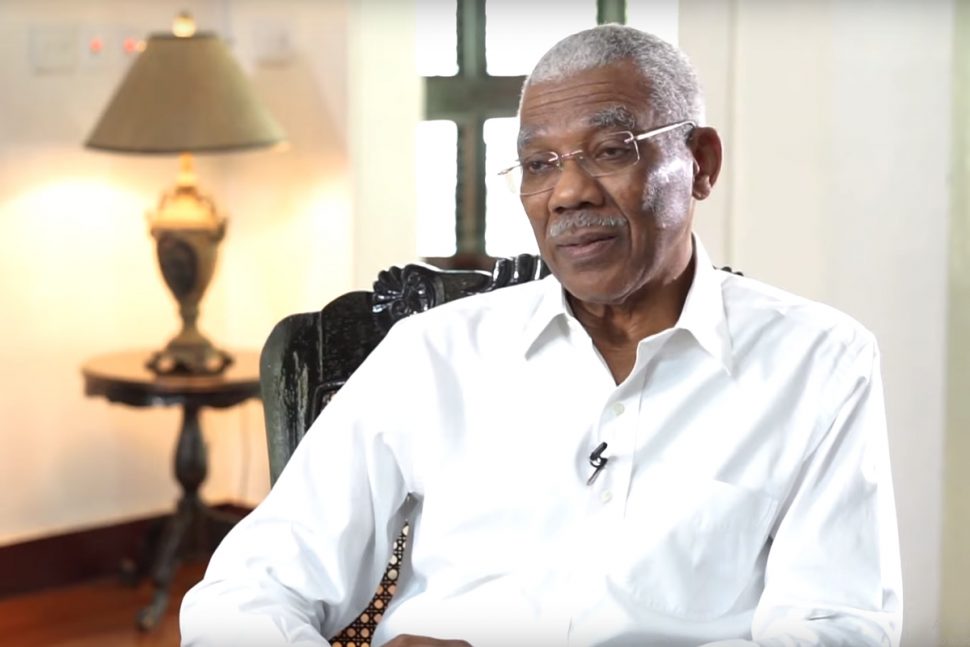President David Granger yesterday declared that all media houses should have access to state advertisements but suggested that these advertisement should be channeled to media houses based on the type of coverage they provide.
“There must be fairness. We believe that advertisements should be directed to the media houses based on their willingness to disseminate news fairly,” the Head of State said during an interview on Kaieteur Radio.
He later noted that he does not “support withholding of advertisements. All media houses must have access to state ads since it is a state resource.”
The president had been asked to provide his view on the Department of Public Information’s (DPI) recent refusal to place ads with Stabroek News following a temporary halt of placements by the newspaper to allow for a settlement of a $22.1 million debt. Stabroek News revealed on Thursday that the newspaper did not receive a single advertisement from DPI in October. Stabroek News’ Editor-in-Chief (EiC) Anand Persaud has said that the total cutoff of ads from DPI in October substantiated the newspaper’s position that the newspaper was being punished for its forthright reportage on the government in the aftermath of the December 21st, 2018 vote of no-confidence against it in Parliament.
Persaud said what might have begun as an attack on the newspaper from within DPI – headed by the Director of Public Information, Imran Khan – will now have to be considered as a full-blown campaign by the government which cannot now claim to be unaware of the situation.
President Granger, however, told his interviewer that while he has not investigated the matter, he believes it to be a commercial dispute. “When the commercial dispute is settled, it will return to normal,” Granger maintained, before accusing the newspaper of bias.
“We need to have journalists, we need to have media houses which are fair. I do not believe it is the right of any editor or of any media house to deliberately not report on public events out of bias,” he said.
The public event he referred to is the observance of the 175th Anniversary of Queen’s College, Granger’s alma mater, and where he gave a speech. President Granger drew attention to a letter written by Mark Archer – who is the Communications Director in the Ministry of the Presidency – which accused Stabroek News of ignoring the event. “My considered opinion is that Queen’s College has contributed immensely to the intelligentsia of Guyana and Stabroek News didn’t see it fit to carry an article about this,” the president stressed.
Using the Latin expression suppressio veri suggestio falsi, which means the suppression of truth is the suggestion of falsehood, the Head of State attempted to argue that by not covering the opening assembly of the celebration, which he termed a major national event, Stabroek News is depriving the people of Guyana of the right to know.
He went on to say that he has evidence that this is not the first time that Stabroek News has done this as, according to him, the failure to cover important national events, including the president, is “habitual.”
Arbiter
Persaud, in a comment yesterday on the president’s remarks, said that there was no commercial dispute between Stabroek News and DPI as the debt to the newspaper had been settled. The EiC said that DPI had fabricated an excuse for the non-placement of ads, which included the unveiling of a new placement policy for state ads which had not been previously disclosed to any media house. Persaud said that DPI’s action constituted an abuse of press freedom and was a direct violation of the Declaration of Chapultepec to which Guyana is a signatory. The EiC added that the president has now introduced a new metric for assigning ads – “fairness” – which could be used as a tool to suppress outlets which didn’t report in a certain manner. Persaud asked who would be the arbiter of fairness in the allocation of state ads and how did this inform the allocations for October where SN received no ads but the state paper, chockful of pro-government matter, rattled up 5,663 column inches. Persaud said the president would have to address the contention of a sizable portion of the public that the Chronicle’s coverage was not fair to other parties and groups but decidedly sycophantic in its reportage on the government.
Persaud said that state advertisements are funded by taxpayers’ money and no government must capriciously decide on allocations. The EiC said that the newspaper has said before that the assigning of ads should be left to professionals in the industry to lessen the risk of politicians targeting newspapers as was the case in 2006 when Stabroek News’ ads were cut for 17 months by the then PPP/C administration. As a newspaper with a respectable reputation over 33 years, Persaud said, it was entitled to a fair portion of state advertising.
Persaud also said that the president’s reference to the absence of coverage of Queen’s College’s 175th anniversary assembly was a non sequitur in the debate on placement of ads. The EiC said that newspapers make decisions on the coverage of events based on likely news value and availability of reporters. He said that the president’s raising of this matter is disconcerting and noted that Stabroek News has reported on a variety of occasions, the president’s declaration of free education to be financed by oil revenues and a decade of development from next year which formed the major part of his presentation at the assembly.
The EiC said that the newspaper covers important national events and that the government and its activities have been given wide and fair publicity and that this will continue. He added that DPI’s actions will leave the government facing the reality that it has used ads to target Stabroek News in violation of the Declaration of Chapultepec.






